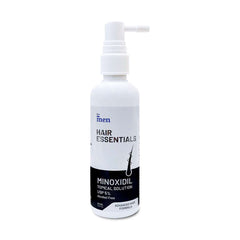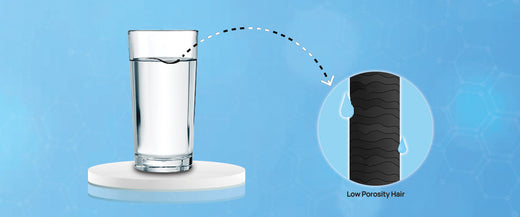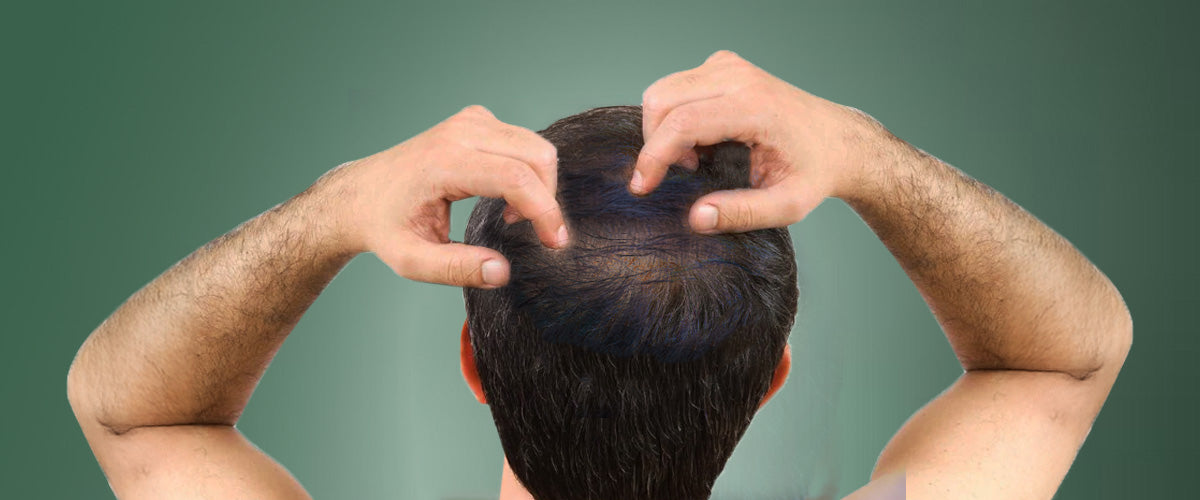What Causes White / Grey Hair?
Evidence Based
All the information in this blog post is accurate, trustworthy, scientifically based and has been written and fact-checked by our experts and doctors.
Our licensed nutritionists and dietitians are committed to being objective, unbiased and honest, presenting all sides of the argument.
This article includes scientific references in brackets, which are clickable links to research papers from reputable academic organizations.

Hair turning grey or white is primarily caused by the loss of melanin production in your hair follicles. Melanin is the pigment that gives your hair its color, so when it stops being produced, the hair grows out colorless, appearing transparent or "white".
What are the Main Causes of White Hair / Grey Hair?
White hair / Grey hair happens due to the following reasons.
1. Age:
This is the most common reason for hair greying. As we age, the melanocytes (cells that produce melanin) in our hair follicles gradually die off. This leads to a decrease in melanin production, and eventually, new hair growth will be grey or white. The average age for greying to start is around 35, but it can vary greatly depending on genetics and other factors.
2. Genetics:
Your genes play a significant role in determining when and how your hair greys. If your parents or grandparents began greying early, you are more likely to do the same.
3. Stress:
Chronic stress can contribute to premature greying, although scientific evidence on this is still developing.
4. Vitamin Deficiencies:
Deficiencies in vitamin B12, vitamin D, or copper can sometimes lead to premature greying.
5. Autoimmune Diseases:
Certain autoimmune diseases like vitiligo can affect hair pigmentation and cause premature greying.
6. Smoking:
Smoking has been linked to an increased risk of premature greying.
What Age Does Hair Greying Start Usually?
Determining a single "starting age" for hair greying in present times is difficult because it's highly individual and influenced by several factors.
However, here is an overview:
Average:
On average, people begin noticing grey hairs around age 35. By age 50, roughly half of both men and women have at least 50% grey hair.
Variations:
Genetics:
Family history plays a significant role. If your parents or grandparents started greying young, you're more likely to follow suit.
Race:
Caucasian individuals tend to grey earlier (mid-30s), while Asians typically grey later (around age 40), and African Americans may grey even later (around age 43).
Stress:
Chronic stress can contribute to premature greying, though evidence is still being researched.
Health Conditions:
Vitamin deficiencies, autoimmune diseases, and smoking can lead to earlier greying.
Present-day Trends:
Some studies suggest a slight tendency for earlier greying, possibly due to environmental factors like increased stress and pollution. However, this observation might also be influenced by changing societal perceptions of grey hair, leading people to notice it earlier than before.
Ultimately, your individual timing for grey hair appearance depends on a complex interplay of factors. Remember, greying is a natural part of aging, and while some choose to cover it, others proudly embrace their silver strands.
How Can We Delay Hair Greying?
While completely preventing hair greying isn't possible, there are definitely steps you can take to potentially delay its onset and maintain healthy hair pigmentation:
Dietary Adjustments:
Prioritize Antioxidant-Rich Foods:
Fresh fruits and vegetables, green tea, olive oil, fish, and dark chocolate are good sources. Antioxidants combat free radicals and oxidative stress, which can contribute to greying.
Focus on Vitamins and Minerals:
Ensure adequate intake of vitamin B12, vitamin D3, copper, iron, zinc, and selenium. Deficiencies in these can contribute to premature greying.
Stay Hydrated:
Drinking plenty of water keeps your body and scalp healthy, supporting overall hair health.
Lifestyle Modifications:
Manage Stress:
Chronic stress can exacerbate greying. Engage in activities like meditation, yoga, or exercise to manage stress levels.
Quit Smoking:
Smoking damages hair follicles and accelerates greying. Quitting can help slow down the process.
Protect Your Hair from Sun Damage:
UV rays can damage hair pigments. Wear hats or apply hair products with SPF when outdoors.
Minimize Harsh Treatments:
Avoid frequent bleaching, dyeing, or heat styling, as these can damage hair follicles and pigment cells. Opt for gentle hair care products and practices.
Natural Remedies:
Scalp massages:
Massaging your scalp with oils like coconut, almond, or olive oil can improve blood circulation to the scalp, potentially promoting hair growth and pigmentation.
Herbal Remedies:
While scientific evidence is limited, some herbs like amla, curry leaves, and black sesame seeds have been used traditionally in hair care and are believed to stimulate melanin production.
Considerations:
Consult a Doctor:
If you experience sudden or rapid greying, consult a doctor to rule out any underlying medical conditions.
Supplements:
While dietary sources are preferred, consider supplements if deficiencies are confirmed through blood tests.
Patience and Consistency:
Remember, these strategies aim to support overall hair health and potentially delay greying, not completely reverse it. Be patient and consistent with your efforts.
Any Vitamins or Mineral Deficiency can also Accelerate Hair Greying?
Yes, deficiencies in certain vitamins and nutrients can contribute to increased hair greying by impacting melanin production or overall hair health.
Here are some key examples:
Vitamin B12:
This vital vitamin plays a crucial role in DNA synthesis and cell division, including those in hair follicles. Deficiencies can lead to abnormal hair growth and pigment production, potentially accelerating greying.
Vitamin D3:
This vitamin helps your body absorb calcium and promotes healthy hair follicles. Studies suggest low vitamin D levels might be linked to premature greying, though more research is needed.
Copper:
This mineral is essential for melanin production and hair pigmentation. A copper deficiency can disrupt melanin synthesis and contribute to early greying.
Iron:
Iron deficiency slows down cell growth and oxygen delivery, impacting hair follicle activity and potentially triggering premature greying.
Biotin:
This B vitamin contributes to the structure of keratin, a protein essential for hair strength and growth. Biotin deficiency can lead to weak, brittle hair and potentially affect pigmentation.
Zinc:
This mineral plays a role in hair follicle health and cell division. Zinc deficiency might be linked to hair loss and potentially greying, though more research is needed.
It's important to note that deficiencies often manifest with broader symptoms beyond just hair greying. If you suspect a deficiency, consulting a doctor for blood tests and personalized advice is crucial.
Remember, even with optimal nutrient levels, genetics and other factors like stress, smoking, and certain illnesses can influence hair greying. However, ensuring sufficient intake of essential vitamins and minerals supports overall hair health and may, in some cases, help moderate the rate of greying.
What is Premature Hair Greying?
Premature hair greying refers to the loss of melanin production in hair follicles at a significantly younger age than expected. This results in the growth of grey or white hair before the typical age of onset, which varies depending on ethnicity and genetics.
Here's a Breakdown of the Key Facts:
- In Caucasians: greying before 20 years old.
- In African Americans: greying before 30 years old.
- In Asians: often defined as before 40 years old.
Why Does Premature Hair Greying happen?
Several factors contribute to premature hair greying:
1. Genetics:
Family history plays a significant role. Genes influence the timing and progression of melanin production in hair follicles.
2. Oxidative Stress:
Free radicals, unstable molecules damaging cells, can accumulate in hair follicles and disrupt melanin production.
3. Autoimmune Diseases:
Conditions like vitiligo can affect melanin production in hair follicles and lead to premature greying.
4. Vitamin and Mineral Deficiencies:
Deficiencies in B vitamins (B12, biotin), vitamin D, copper, iron, and zinc can impact melanin production and hair health.
5. Medical Conditions:
Thyroid disorders, anemia, and hormonal imbalances can sometimes contribute to premature greying.
6. Environmental Factors:
Chronic stress, smoking, and pollution are suspected to play a role, though evidence is still evolving.
Is It Reversible?
Unfortunately, not completely. Once hair follicles lose melanin production, the growing hair strand remains grey/white. However, addressing the underlying factors, like managing stress, treating deficiencies, or controlling certain medical conditions, can potentially slow down further greying and promote healthy hair growth.
How to Manage Premature Hair Greying?
- Embrace Your Natural Hair: Many individuals rock their grey hair with confidence!
- Hair Dyeing and Other Treatments: Dyes, highlights, or lowlights can effectively cover grey hair.
- Healthy Lifestyle: Focus on a balanced diet, regular exercise, stress management, and adequate sleep to support overall hair health.
- Consult a Doctor: If you experience sudden or rapid greying, rule out any underlying medical conditions.
The rate and age of hair greying is widely individualistic and is a normal aging process.
Also Read the Articles:
Disclaimer: The information provided on this page is not a substitute for professional medical advice, diagnosis, or treatment. If you have any questions or concerns about your health, please talk to a healthcare professional.

 Evidence Based
Evidence Based






Leave a comment